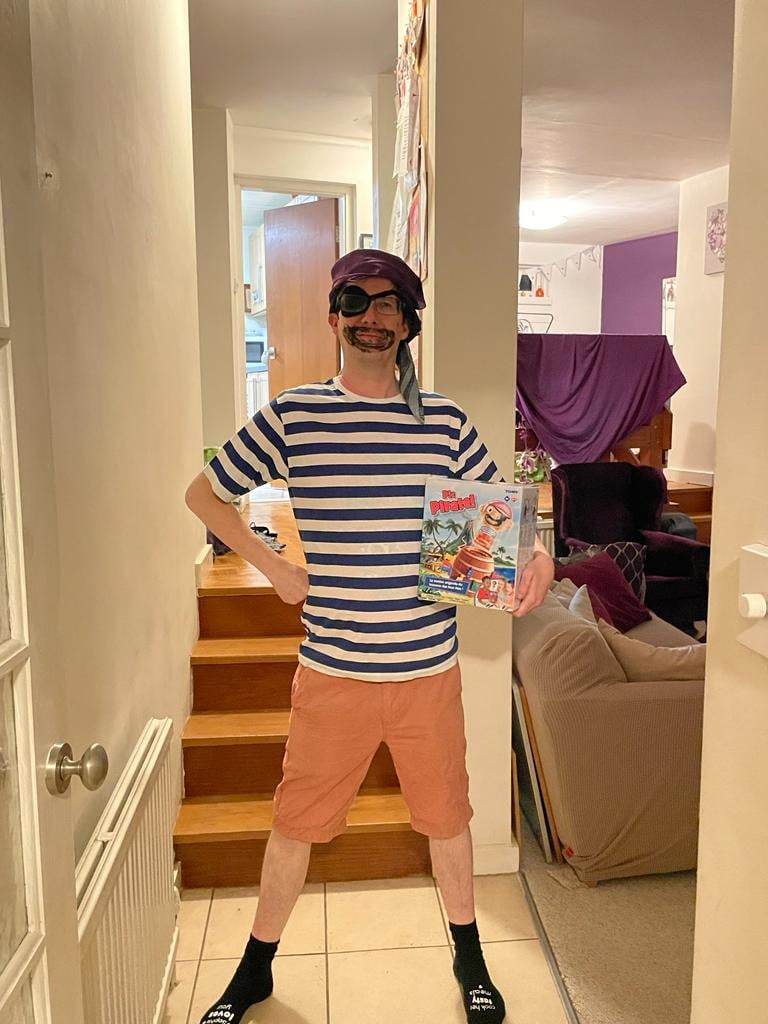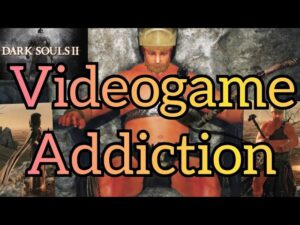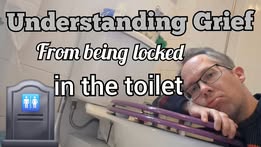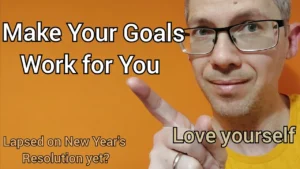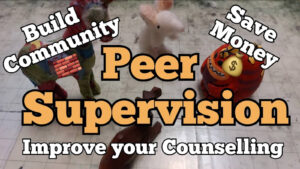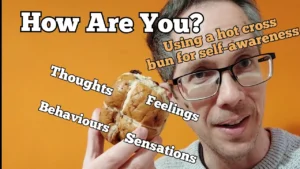Contents
Videogame Addiction
This article is adapted from the 50th Episode of The Talkroom Podcast with Hope Therapy and Counselling Services from July 2025. One of the top 100 mental health podcasts. You can watch the full episode in the embedded video above
Intro
This article is all about video game addiction. What it is, how addiction (or compulsive gaming) presents, and some strategies or therapies to work with it. Although it is about Gaming Addiction I want to highlight that gaming is not maladaptive or wrong and actually helps us to meet a lot of our needs.
Statistics
- 10.84 million people in the UK enjoy gaming
a normal activity enjoyed by one in seven people - The average age of a gamer in the UK is 28 (in New Zealand it’s 35).
It’s not just for children or young people - 48% of Gamers are Female
- Internet Gaming Disorder was recently added to the ICD-11
It’s a real medical condition - 700,000 – 1 million people in the UK are estimated to have Video Game Addiction issues
up to one in every eleven gamers
My Story
Growing up things could be quite hard at home. My parents loved me dearly and were doing their best, but mum very much struggled with her mental health and without going into too much detail about that, I found this really difficult as a child. It pushed responsibilities onto me that were just too adult and didn’t really give space for my own feelings. I found things too intense, but as a dependent child (as well as a young-carer), I didn’t really have an escape and found my mind would often wonder to worrying about my care-giver’s welfare.
I needed that escape, a brief holiday from the strain of home-life; and then came my first games console: a Sega Genesis, and it was then that Gaming started to help me meet my needs and helped me to cope.
Gaming gave me an escape from the intensity of what was going on a home, I could switch on a game and switch off from the intense thoughts or feelings that my childhood self didn’t know how to process – and immerse myself into the game that captivated my mind and gave me that pause from life.
Then as the gaming consoles evolved, so did life.
My sister and I would structure so much of our time to Pokémon battles – connecting with each other, researching what moves or evolutions could happen, and competing as we did another play through of Pokémon Ruby and Sapphire.
I met friends in school, who would come over and we’d have an all-nighter playing Super Smash Bros or Golden Eye 64.
At GCSEs, we’d sit round playing FIFA together on the PS2, which was such a simple and beautiful way to connect with friends that took off any pressures of social interaction & facilitated connection as my mates yet again thrashed me.
It didn’t matter that I lost at FIFA though – video games taught me to lose, they taught me to grind and work towards advancement, that I could try again if I failed – to Git Gud at Dark Souls;
They taught co-operation and forged friendships as me & my mates swapped controller after each life lost in Sonic.
They watered my creativity as we designed levels in Tenchu or songs in Music 2000,
They allowed me to be competent at uni, where reinventing yourself is hard, but I could have that competence by being the best at Super Smash Bros Melee on the Gamecube.
And they still provide this when
– I’m dysregulated or tired, need to passively process, or just have a break from the usual structure in life.
I don’t seem to game quite as much these days, and maybe that’s part of the peace that I’m discovering in life, but I still love video games – even today I look forwards to continuing The Shadow of the Erdtree DLC in Elden Ring, or seeing if my wife fancies local co-oping though Balder’s Gate 3.
I’ve also experienced my fair share of compulsive gaming. Periods where I cannot pull away from RPGs like Runescape, where I’ve had to yet again uninstall Binding of Isaac where I’m spending too much time on it, where I’m thinking about Warlight and virtual friends there rather than being present in my relationships.
Video Game Addiction
The definition of addiction really varies depending on what model you approach it from.
The NHS’s site refers to addiction as
“not having control over doing, taking, or using something to the point where it could be harmful to you.”
Now, this fits in quite nicely with 12 Step Programs like AA that would define it almost like a disease:
Step 1: “we admitted that we were powerless over our gaming – that our lives had become unmanageable”.
Addiction is a bit like being allergic to a substance or behaviour: most folks will have a glass of wine with a meal, whereas the addict will find themselves unable to stop drinking, and the same with gaming: addiction means being unable to pull ourselves away from our gaming habits – even though we want to, to be powerless over our gaming.
The National Institute of Drug Abuse’s definition of addiction includes:
“A chronic relapsing disorder, characterised by compulsive drug seeking and use, despite adverse consequences”
which emphasises just how much space the addiction takes up and the painful result of that – almost like gaming becomes part of us, and neurologically it does. It changes our brain structures around control, reward, & impulsivity.
Now, if we picture alcohol or drugs – we are likely to also begin to build tolerance to that substance such that we need more of the substance to have the same effect, and eventually we need copious amounts of the substance just to feel normal.
This is the same with behavioural addictions: whether that be shopping, gambling, porn, eating or gaming.
We might start using gaming to feel good or meet our needs, but with Addiction, it gets to a point where we need to game just to feel normal.
Symptoms of Videogame Addiction
- A compulsion to game and a need to spend increasing amounts of time gaming meaning we cannot do other things
- Interoceptive needs like remembering to get enough food, water, and sleep.
- Self-Care might decline such as we aren’t bathing or going to the GP.
- Physical health static posture or staring at a screen
- Exercise and Daylight
- Neglect our family & relationships, or work and school which can have financial and developmental consequences.
- Finances spending loads of money on loot boxes or new skins which can mirror gambling addiction. Or buying new games and DLCs we cannot afford
- social exposure may be filtered through the games we play, which can make social interaction outside of the game harder, and not give space to develop social skills outside of that game. This can lead to a deep sense of loneliness and only push us deeper into gaming and increase our fears of socialising.
- Cravings –when we aren’t gaming, cravings make us think of gaming, like our whole selves are driven towards returning to our consoles. This can rob us of our presence and cause us to get quite frustrated with people close to us that block us from gaming.
- Lying or manipulating those around us so that we can use the substance more – for example, we might pull a sicky at work when we’ve just downloaded a new game.
- Anhedonia, which means an inability to find joy in anything else besides gaming because nothing else quite fills that hole, making the rest of life seem dull. It mirrors depression and is sad because with tolerance even the game doesn’t make us happy, but nothing else does either.
- Mental health conditions such as dissociation, concentration difficulties, mood disorders such as depression & anxiety, social phobias, loneliness, paranoia, and existential issues on purpose in life.
Treatments
Hope (who I was on the podcast with) offer each of these and the Dodo Bird Verdict seems to show that all therapeutic interventions work fairly equally and what’s most important is finding an approach that works for you).
- CBT to notice thoughts, patterns and behaviours around gaming or triggers and automatic thoughts.
- SMART Recovery: a CBT approach to gaming
- Gaming Addicts Anonymous: a 12 step fellowship
- Mindfulness to work with cravings and tolerance to emotions that emerge when we game less
- Trauma work for traumas that might predispose us to problematic gaming
- Counselling
My Approach
I’m a Person-Centred Counsellor, which is a relational approach to therapy – very much tailored to you, at your pace, and equipping you to lead the therapy so that you can access that ability to lead your own life out of difficulties.
Person Centred philosophy has three attitudes behind it:
- Radical Acceptance
you will be seen as doing your best and wholeheartedly valued throughout the therapy, which has a contagiousness about it, until you can start to find that same value & self-compassion for yourself. - Deep Empathy
Being curious about your experience, because your world makes sense from your perspective. Being open to how you communicate, whether that be more emotionally, or in a different way. Empathy helps you build connection with yourself. - Realness, helping you to face things that are uncomfortable, and being open to whatever comes up.
To use DnD as an example;
As a therapist, I’d like to form an adventuring party with you, journeying with you to face the BBEG of Video Game Addiction, and recognising that you have your own abilities & skills that will be invaluable in this adventure.
Needs being met
Check out my article or two videos on therapeutic needs being met in gaming.
Alexander Kriss wrote a book, The Gaming Mind, where he talked about the answer to compulsive gaming being to recognise the subconscious needs being met with out gaming so we can meet those needs outside of the game. In my Needs article, I identify 17 needs we might be meeting:
- To Pause & Escape
- Mastery
- Levelling up
- Optimising
- Exploration
- Role play
- Social Skills & loneliness
- Testing Morality
- Competition & failure
- Fun & Stimulation
- Mood regulation
- To build empathy
- To make decisions
- To process trauma
Stages of Change
Stopping something we are addicted to is a long journey, and a lot of the decisions happens whilst we are still actively using. We can’t stop using Gaming if we have nothing to replace it with, so I’d be curious where you’re at and interventions vary depending on this stage.
For example
– if you’re spending 12 hours a day gaming, and most of your life centres on it, we might be looking at just reducing the harmful effects and seeing how we can build in time for other aspects of self-care or little breaks. We will likely navigate this by talking about your games in session with curiosity rather than any judgement and the game itself taking up much of the session space.
– If you’ve stopped gaming, we might be looking at something called Relapse Prevention – which means looking at what might risk you heading back into destructive cycles of Video Game Addiction, risky situations, little cues that we are heading towards a relapse, and how to cope with triggering events. We may also be working out whether abstinence from gaming is what you need, or if you’re able to develop a healthy balance where you can still enjoy gaming in moderation.
– Maybe you feel you have that healthy balance. You’re quite happy with playing Call of Duty for a few hours in the evening, but your partner feels neglected and wants you to reduce your screen time. We might talk about communication, boundaries, and compromise.
– Maybe you’re contemplating change, but there are comorbidities you’d like to work on like social anxiety – you like the thought of a meet-up but you’ve only been able to do it online before, and a face to face fills you with dread, so you are looking to build skills before you are ready to reduce your gaming.
Community
Addiction is best treated holistically. It thrives in secret and without community. Counselling can be an intervention, but you’ll likely find more success if you can build a network outside of gaming that you can talk with when you’re struggling; and will both support you as well as hold you accountable in your recovery.
I mentioned the 12 steps when I discussed the definition of Powerlessness and there is a 12 Step Program called Gaming Addicts Anonymous which has a few face to face meetings in the UK, and many multinational online meetings.
Simon is a Person-Centred Counsellor in Oxford working remotely and in person. He has lived in the county his whole life, and the city for almost 20 years. He appreciates the beauty of the city, nature, and connecting with people to help bring about meaningful change.
He is also a geek – who gets tremendous joy from gaming, crafting, cosplay, and creativity

